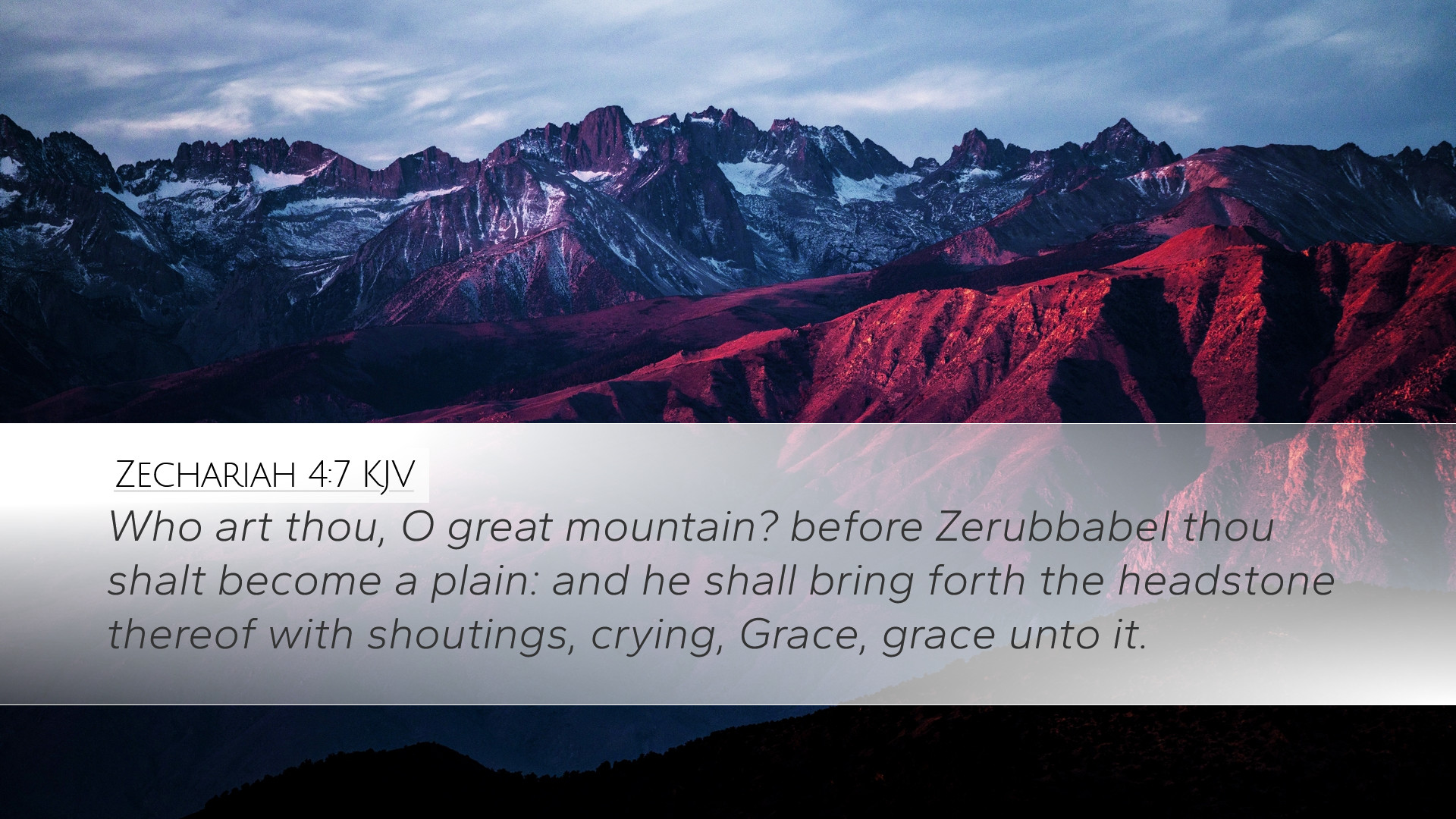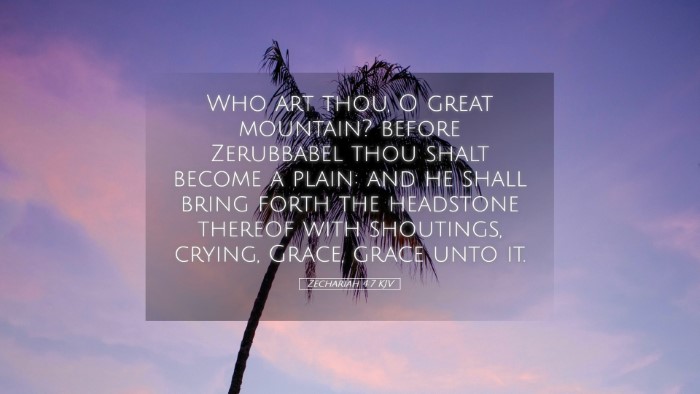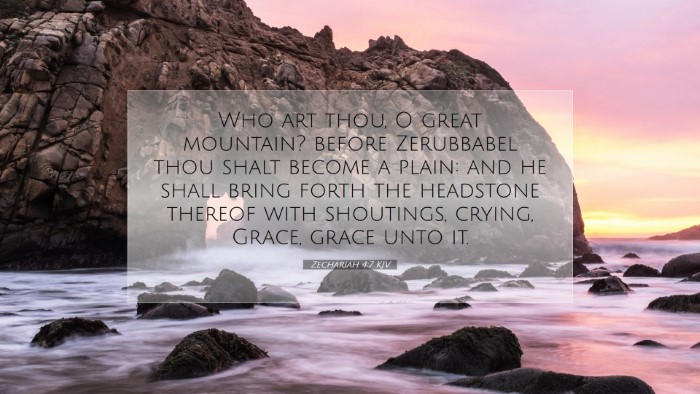Old Testament
Genesis Exodus Leviticus Numbers Deuteronomy Joshua Judges Ruth 1 Samuel 2 Samuel 1 Kings 2 Kings 1 Chronicles 2 Chronicles Ezra Nehemiah Esther Job Psalms Proverbs Ecclesiastes Song of Solomon Isaiah Jeremiah Lamentations Ezekiel Daniel Hosea Joel Amos Obadiah Jonah Micah Nahum Habakkuk Zephaniah Haggai Zechariah MalachiZechariah 4:7
Zechariah 4:7 KJV
Who art thou, O great mountain? before Zerubbabel thou shalt become a plain: and he shall bring forth the headstone thereof with shoutings, crying, Grace, grace unto it.
Zechariah 4:7 Bible Commentary
Commentary on Zechariah 4:7
Bible Verse: "Who art thou, O great mountain? before Zerubbabel thou shalt become a plain: and he shall bring forth the headstone thereof with shoutings, crying, Grace, grace unto it."
Introduction
Zechariah 4:7 is a profound verse illustrating God's promise and power in the context of the rebuilding of the temple in Jerusalem. This verse speaks to overcoming obstacles, divine empowerment, and the significance of grace in the ministry of Zerubbabel. The prophet Zechariah, following the Babylonian exile, conveys to us a powerful message of hope and reassurance.
Contextual Analysis
To fully appreciate the significance of this passage, it is essential to understand its context in the Book of Zechariah, particularly the vision given to him in Chapter 4. This vision includes the golden lampstand and the two olive trees, representing the divine supply of grace and strength to Zerubbabel and Joshua.
Historical Background
The post-exilic community faced numerous challenges, including political opposition, moral decay, and the daunting task of rebuilding God’s temple. In this charged atmosphere, Zechariah’s message served to equip and inspire the leaders and the populace.
Key Themes
- Divine Empowerment: The "great mountain" signifies the immense obstacles Zerubbabel faced. God assures that these obstacles will be levelled.
- The Role of Grace: The repetition of "Grace, grace unto it" emphasizes God's unmerited favor as fundamental to success in spiritual endeavors.
- Fulfillment of God's Promise: The promise that Zerubbabel would lay the foundation and bring forth the headstone assures the people of God's ongoing faithfulness.
Commentary Insights
Matthew Henry
Matthew Henry emphasizes the sovereignty of God over every towering obstacle represented by the "great mountain." He notes that what appears insurmountable to human eyes is merely a challenge for divine intervention. Henry underlines the phrase "before Zerubbabel thou shalt become a plain," signifying that God must prepare the way for those He appoints. This preparation is both spiritual and practical, ensuring that Zerubbabel can accomplish the work assigned to him.
Albert Barnes
Albert Barnes provides a thorough analysis of the metaphorical implications of the "mountain." He argues that the mountain illustrates the visible difficulties in the way of rebuilding the temple: the opposition from neighbors, the lack of resources, and the diminished morale among the people. For Barnes, the promise that Zerubbabel will be successful becomes a rallying point for faith in God’s capability to remove these barriers. He notes the spontaneous joy associated with the completion of the project as indicated by the shoutings of "Grace, grace unto it," expressing reliance on divine assistance throughout the endeavor.
Adam Clarke
Adam Clarke focuses on the importance of Zerubbabel’s role and the symbolic nature of the construction process. He interprets the "headstone" as not just a physical object but a representation of completion and divine approval. Clarke elaborates on the significance of shouting "Grace, grace," indicating a communal acknowledgment of God’s grace in their lives—a reflection of gratitude that serves both as encouragement in hard times and as a reminder that no achievement is possible without divine support.
Theological Implications
This verse holds significant theological implications, especially concerning the closing of the Old Testament narrative and its implications for New Testament believers. The theme of grace, combined with the energetic approach to ministry, resonates deeply with the call of Christians today to engage in their mission despite overwhelming challenges. The metaphor of the mountain signifies various modern barriers, including doubts, cultural opposition, and personal shortcomings.
Application for Church Leaders
For pastors and church leaders, Zechariah 4:7 serves as a potent reminder that challenges in ministry are not insurmountable when seen through the lens of faith. Leaders must encourage their communities to look past the obstacles, relying on God's empowering grace to forge ahead. The reassurance that God is sovereign over every hindrance should motivate congregations to unite and build God's kingdom actively.
Application for Theologians
Theologians can draw from this verse content-rich insights on the synergistic relationship between divine grace and human effort. The successful completion of God's work relies on His initiative as much as on human cooperation. The eschatological dimensions also invite theological discourse on how God's promises in the Old Testament foreshadow the complete act of salvation through Christ, where every mountain of sin is displaced by grace.
Conclusion
Zechariah 4:7 encapsulates a foundational promise of God's providence and grace, a theme echoed throughout both the Old and New Testaments. As we reflect on this passage, may believers draw upon the certainty that with God, great mountains can and will be made into plains. The call to faith, resilience, and reliance on divine grace serves as an enduring message for all who aspire to follow God's greater calling.


